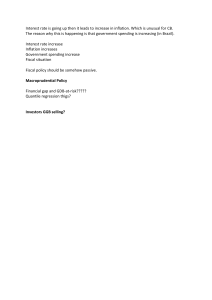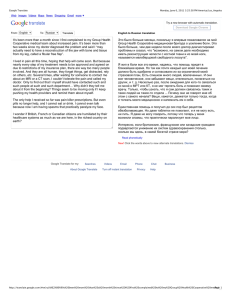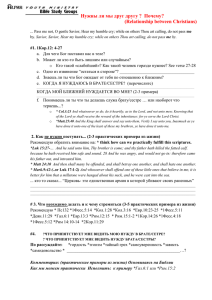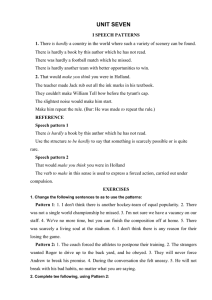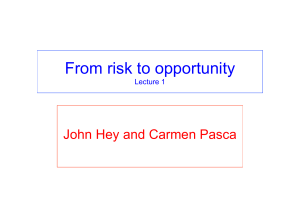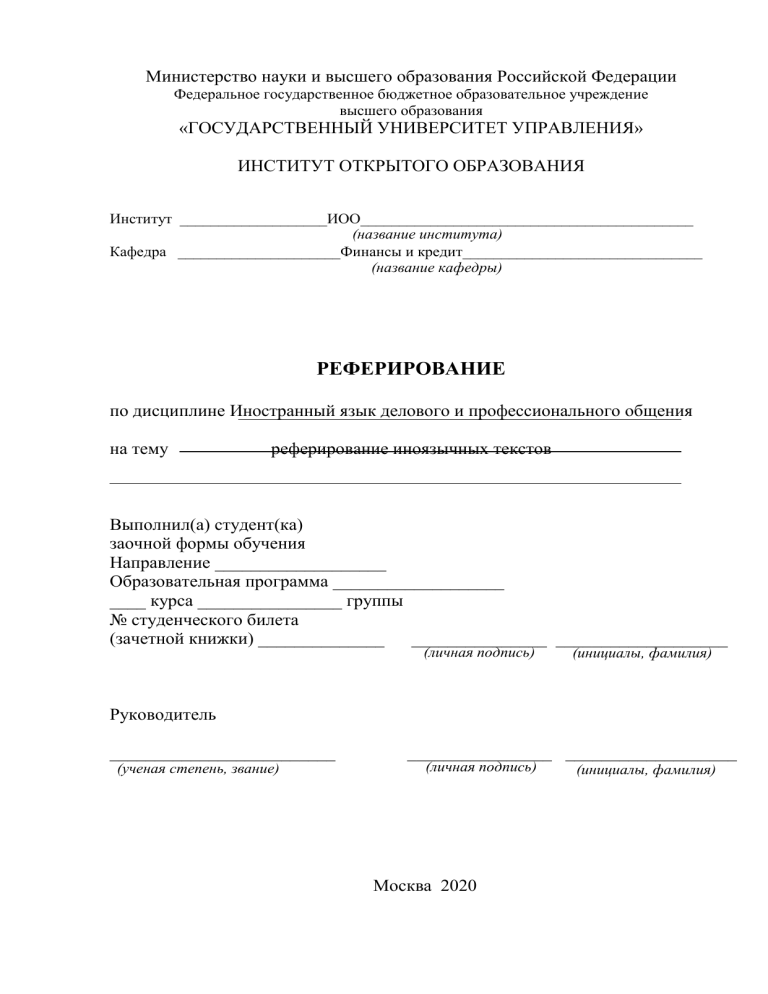
Министерство науки и высшего образования Российской Федерации Федеральное государственное бюджетное образовательное учреждение высшего образования «ГОСУДАРСТВЕННЫЙ УНИВЕРСИТЕТ УПРАВЛЕНИЯ» ИНСТИТУТ ОТКРЫТОГО ОБРАЗОВАНИЯ Институт ___________________ИОО___________________________________________ (название института) Кафедра _____________________Финансы и кредит_______________________________ (название кафедры) РЕФЕРИРОВАНИЕ по дисциплине Иностранный язык делового и профессионального общения на тему реферирование иноязычных текстов Выполнил(а) студент(ка) заочной формы обучения Направление ___________________ Образовательная программа ___________________ ____ курса ________________ группы № студенческого билета (зачетной книжки) ______________ _______________ ___________________ (личная подпись) (инициалы, фамилия) Руководитель _________________________ (ученая степень, звание) ________________ ___________________ (личная подпись) Москва 2020 (инициалы, фамилия) ОГЛАВЛЕНИЕ ОГЛАВЛЕНИЕ……………………………………………………………2 1)Аннотация на русском языке…………………………………………..3 2)Аннотация на английском языке………………………………………5 3)Статья……………………………………………………………………6 4)Глоссарий………………………………………………………………12 5)Список литературы ……………………………………………………14 2 Основная идея статьи, это рост налогов на богатых. На Данный момент в Вашингтоне действует система низких налогов. Elizabeth Warren утверждает обратное, что облагать налогами богатых и тратить доходы на подъём бедных, поможет ускорить экономику страны. К её мнению присоединяются и другие либеральные экономисты. Они утверждают что налогообложение богатых поможет росту независимо от того куда правительство потратит деньги. В 2016 году данная тема обсуждалось Хиллари Клинтон, но не было достаточно аргументов. Warren предлагала почти 3 трлн долларов в год новых налогов на бизнес и высокодоходных в основном ориентированных на миллиардеров. Эти налоги она предложила финансировать в здравоохранении, образования и семейные пособия. Elizabeth Warren уверена что это приведет к росту экономики страны. Их аргумент объединяет достоверные данные, свидетельствующие о том, что высокий уровень неравенства и концентрации богатства сдерживает экономический рост с верой в то, что целенаправленные государственные расходы могут побудить больше американцев работать, инвестировать и развивать навыки, которые сделают их более продуктивными. Соединённые Штаты в настоящее время имеет одну из самых низких налоговых нагрузок. Налоговые поступления упали на до 24,3 процента. Америка занимает четвертое место по уровню налоговой нагрузки среди всех O.E.C.D. Демократы опровергают данную теорию, они считают что средние и бедные класс увеличат потребительские расходы, Чем богаты класс- которые умеют инвестировать и сберегать. Экономист Стефани Келтон, советник сенатора Берни Сандерс из Вермонта, утверждают, что правительство Соединенных Штатов должно тратить гораздо больше на программы по борьбе с неравенством, такие как федеральная гарантия занятости, без наложения новых налогов. Сторонники Elizabeth Warren утверждают что данное предложение нанесет ущерб экономике. В последних дебатах демократов Elizabeth Warren сказала, что программы расходов, финансируемые ее налогом на богатство, будут «преобразующими» для рабочих. Эти планы 3 повысят зарплату, сделают колледж бесплатным и освободят выпускников от студенческих долгов. На мой взгляд идея увеличения налогов на богатых, в пользу среднего и низшего класса не может привести к увеличению роста экономики страны. Потому что передача денег бедным или сам среднего класса увеличат только потребительские расходы. 4 The main idea of the article is the increase in taxes on the rich. At the moment, Washington has a system of low taxes. Elizabeth Warren argues the opposite, that taxing the rich and spending income on raising the poor will help accelerate the country's economy. Other liberal economists join her opinion. They argue that taxing the wealthy will help growth no matter where the government spends money. In 2016, this topic was discussed by Hillary Clinton, but there were not enough arguments. Warren was offering nearly $ 3 trillion a year in new business taxes and high-yield, mostly targeted at billionaires. She proposed to finance these taxes in healthcare, education and family benefits. Elizabeth Warren is confident that this will lead to the growth of the country's economy. Their argument combines reliable evidence that high levels of inequality and concentration of wealth inhibit economic growth with the belief that targeted government spending can encourage more Americans to work, invest and develop skills that will make them more productive. The United States currently has one of the lowest tax burdens. Tax revenues fell to 24.3 percent. America ranks fourth in tax burden among all O.E.C.D. Democrats refute this theory, they believe that the middle and poor classes will increase consumer spending. How rich are the classes - who can invest and save. Economist Stephanie Kelton, an adviser to Senator Bernie Sanders of Vermont, argues that the United States government should spend far more on anti-inequality programs, such as federal job security, without levying new taxes. Supporters of Elizabeth Warren argue that this proposal will harm the economy. In recent Democratic debates, Elizabeth Warren said spending programs funded by her wealth tax would be “transformative” for workers. These plans will increase salaries, make college free, and free graduates from student debt. In my opinion, the idea of increasing taxes on the rich in favor of the middle and lower classes cannot lead to an increase in the growth of the country's economy. Because the transfer of money to the poor or the middle class itself will only increase consumer spending. 5 Could Tax Increases Speed Up the Economy? Democrats Say Yes Led by Elizabeth Warren, presidential candidates and liberal economists are pushing an unorthodox “pro-growth” argument for raising taxes on the rich. WASHINGTON — Elizabeth Warren is leading a liberal rebellion against a long-held economic view that large tax increases slow economic growth, trying to upend Democratic policymaking in the way supply-side conservatives changed Republican orthodoxy four decades ago. Generations of economists, across much of the ideological spectrum, have long held that higher taxes reduce investment, slowing economic growth. That drag, the consensus held, would offset the benefits to growth from increased government spending in areas like education. Ms. Warren and other leading Democrats say the opposite. The senator from Massachusetts, who is a leading candidate for the Democratic presidential nomination, contends that her plans to tax the rich and spend the revenue to lift the poor and the middle class would accelerate economic growth, not impede it. Other Democratic candidates are making similar claims about their tax-and-spend proposals. Some liberal economists go further and say that simply taxing the rich would help growth no matter what the government did with the money. Democrats in the past, including the party’s 2016 nominee, Hillary Clinton, have argued that a more modest combination of tax increases and spending programs would expand the economy. But no Democratic nominee before Ms. Warren had ever proposed so many new taxes and spending programs, and leaned so heavily into the argument that they would be, in economist parlance, progrowth. That argument tries to reframe a classic debate about the economic “pie” in the United States by suggesting there is no trade-off between increasing the size of the pie and dividing the slices more equitably among all Americans. Ms. Warren has proposed nearly $3 trillion a year in new taxes on businesses and high-earners, largely focused on billionaires but sometimes hitting Americans who earn $250,000 and above per year. The taxes would fund wide6 reaching new government spending on health care, education, and family benefits like universal child care and paid parental leave. Last month, Ms. Warren wrote on Twitter that education, child care and student loan relief programs funded by her tax on wealthy Americans would “grow the economy.” In a separate post, she said student debt relief would “supercharge” growth. The last batch of economists to disrupt a political party’s consensus position were conservative — the so-called supply-siders who built influence in the late 1970s and gained power in the Reagan administration. Previous Republican presidents had focused on keeping the budget deficit low, which constrained their ability to cut taxes if they did not also cut government spending. Supply-siders contended that well-targeted tax cuts could generate big economic growth even without spending cuts. Ms. Warren is making the case that the economy could benefit if money is redistributed from the rich and corporations to uses that she and other liberals say would be more productive. Their argument combines hard data showing that high levels of inequality and wealth concentration weigh down economic growth with a belief that well-targeted government spending can encourage more Americans to work, invest and build skills that would make them more productive. Fueling their argument is the fact that the United States now has one of the lowest corporate tax burdens among developed nations — a direct result of President Trump’s 2017 tax cuts. Tax revenues at all levels of government in the United States fell to 24.3 percent of the economy last year, the Organization for Economic Cooperation and Development reported on Thursday, down from 26.8 percent in 2017. America is now has the fourth lowest tax burden in all of the O.E.C.D., just above Mexico, Chile and Ireland, a development that Democrats say has helped corporate executives and shareholders get rich but has done little to help working Americans. In making their pitch, Democrats cite evidence that transferring money to poor and middle-class individuals would increase consumer spending because they 7 spend a larger share of their incomes than wealthy Americans, who tend to save and invest. “The economy has changed, our understanding of it has changed, and we understand the constricting effects of inequality” on growth, said Heather Boushey, the president of the Washington Center for Equitable Growth, a think tank focused on inequality. Inequality has widened significantly in America over the last several decades. The Congressional Budget Office estimates that the incomes of the top 1 percent of Americans more than tripled from 1979 to 2016, before taxes and government transfer payments are taken into account. For the middle class, incomes grew 33 percent. More than a decade after the recession, wage growth for the middle class continues to run well behind previous times of economic expansion, like the late 1990s. Research by the economist Emmanuel Saez and colleagues shows that the last time such a small sliver of Americans controlled such a large share of the nation’s income and wealth was in the late 1920s, just before a stock market crash set off the Great Depression. World Bank researchers have warned that high levels of inequality are stifling growth in South Africa, which has the globe’s worst measured inequality. “We have an economy that isn’t delivering like it used to,” said Ms. Boushey, who advised Hillary Clinton’s 2016 Democratic presidential campaign. “That’s leading people to say let’s re-examine the evidence.” The contention that tax and spending increases can lift economic growth is not the only challenge to traditional orthodoxy brewing in liberal economic circles. Some Democrats have also embraced modern monetary theory, which reframes classic thinking that discourages large budget deficits as a drag on growth. Its supporters, including Representative Alexandria Ocasio-Cortez of New York and the economist Stephanie Kelton, an adviser to Senator Bernie Sanders of Vermont, argue that the United States government should be spending much more on 8 programs to fight inequality, like a federal job guarantee, without imposing new taxes. Some of the inequality-focused economists say they are hoping to build new economic models to predict the effects of their policies, though they acknowledge few of those models exist yet. Instead, they rely on evidence about the likely effects of individual programs, added together. Many economists who study tax policy contend that Ms. Warren’s plans — and other large tax-and-spend proposals from Democratic candidates this year — would hurt the economy, just as classic economic models suggest. “Some elements of the large increase in government spending on health and education proposed by Senator Warren would promote economic growth” through channels like improved education, said Alan Auerbach, an economics professor at the University of California, Berkeley, who has written some of the most influential research in the profession on the relationship between tax rates and growth. But, he said, “I am very skeptical that these growth effects would offset the negative effects on growth of the higher taxes, particularly given that the spending increases are not specifically targeted toward enhancing growth.” Ms. Warren disagrees. In the latest Democratic debate, she said the spending programs funded by her wealth tax would be “transformative” for workers. Those plans would raise wages, make college tuition-free and relieve graduates of student debt, she said, adding, “We can invest in an entire generation’s future.” An emerging group of liberal economists say taxes on high-earners could spur growth even if the government did nothing with the revenue because the concentration of income and wealth is dampening consumer spending. “We are experiencing a revolution right now in macroeconomics, particularly in the policy space,” said Mark Paul, an economist who is a fellow at the liberal Roosevelt Institute in Washington. “We can think of a wealth tax as welfare-enhancing, in and of itself, simply by constraining the power of the very wealthy” to influence public policy and distort markets to their advantage. 9 Taken together, Ms. Warren’s proposals would transform the role of federal taxation. If every tax increase she has proposed in the campaign passed and raised as much revenue as her advisers predict — a contingency hotly debated among even liberal economists — total federal tax revenue would grow more than 50 percent. The United States would leap from one of the lowest-taxed rich nations to one of the highest. It would collect more taxes as a share of the economy than the Netherlands and only slightly less than Italy. Mr. Sanders’s plan envisions a similarly large increase in tax levels. Former Vice President Joseph R. Biden Jr.’s proposals are much smaller in scale: He would raise taxes on the wealthy and corporations by $3.4 trillion over a decade, in order to fund increased spending on health care, higher education, infrastructure and carbon emissions reduction. If Ms. Warren’s tax program is enacted, said Gabriel Zucman, an economist at Berkeley who is an architect of her wealth tax proposal, “in my view, the most likely effect is a small positive effect on growth, depending on how the revenues are used.” Another economist who has worked with the Warren campaign to analyze its proposals, Mark Zandi of Moody’s, said he would expect her plans to be “largely a wash on long-term economic growth.” Researchers at the Levy Economics Institute of Bard College projected this summer that Ms. Warren’s wealth tax and spending policies would generate a 1.7 percent increase in the size of the economy. A preliminary study of a wealth tax like Ms. Warren’s proposal, by the Penn Wharton Budget Model, found that it would reduce the size of the economy by a similar 1.7 percent. The model uses the sort of classic methodology that liberals are now rebelling against and did not evaluate Ms. Warren’s spending proposals. Historical experience offers few parallels for assessing the economic effects of a taxation-and-spending program on the scale of Ms. Warren’s ambitions. A 10 2002 study of wealth taxes in rich countries found that those taxes, most of which have since been abandoned, reduced economic growth slightly on an annual basis. Conservative economists roundly disagree that large tax increases can spur faster growth, even those who say government spending on paid leave and child care may get more Americans into the labor force. They say a wealth tax on the scale of Ms. Warren’s proposal would greatly reduce savings and investment by the rich. “What a wealth tax does is, it directly taxes savings,” said Aparna Mathur, an economist at the conservative American Enterprise Institute who favors a narrow paid leave program and whose research finds benefits from reducing tax rates on business and investment. “If you’re taxing savings, you’re implicitly taxing investment. So how can that possibly be pro-growth?” The supply-side economists’ plans were similarly denounced — George Bush called them “voodoo economic policies” while running for president in 1980 — but in time dominated Republican proposals. Some members of the new liberal revolt against tax orthodoxy welcome the comparison to the supply-side uprising. “While I think that the supply-siders were wrong, and were always wrong, they were reacting to very real economic problems in the 1970s,” said Michael Linden, the executive director of the Groundwork Collaborative, a liberal policy and advocacy group. “There was something really wrong with the economy at the time. I think there is now.” 11 Глоссарий tax обязательный, налог индивидуально безвозмездный платёж, взимаемый с организаций и физических лиц в форме отчуждения принадлежащих им на праве собственности, хозяйственного ведения или оперативного управления денежных средств, в целях финансового обеспечения деятельности государства и муниципальных образований debate чётко структурированный и дебаты специально организованный публичный обмен мыслями, прения между двумя сторонами по актуальным темам. fund выделять денежные средства финансировать debt один из критериев оценки задолженность финансового состояния хозяйствующего субъекта, отражающего позицию данного субъекта в кредитных отношениях с финансовыми институтами consensus position способ разрешения конфликтов при принятии 12 консенсусная позиция решений deficit недостача дефицит spend это уменьшение расходы экономических выгод в результате выбытия активов argument утверждение или группа аргумент утверждений , приводимые в подтверждение другого утверждения OECD- Organization for Организация Economic Cooperation экономического and Development сотрудничества и развития shareholders это владелец акций, участник акционер акционерного общества consumer spending часть национального товара; потребительские общие расходы домохозяйств расходы на потребительские услуги и товары incomes денежные средства или доходы материальные ценности, полученные государством, физическим или юридическим лицом save сохранять в целости сберегать invest размещение капитала с инвестировать целью получения прибыли inequality неравенство в доступе к благам 13 Неравенство Список литературы 1. Dec. 6, 2019, Section B, Page 1 of the New York edition with the headline: New Mantra for Democrats: Share the Economic Pie. 2. Словарь финансово-экономических терминов / А. В. Шаркова, А. А. Килячков, Е. В. Маркина 14
